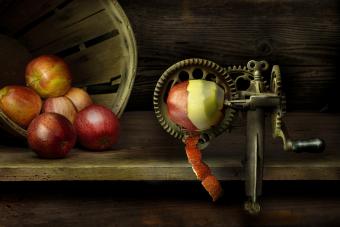
You don't have to be an antiquarian dealer to be able to parse out some antique book values. Whether you scored an assorted lot at an estate auction or inherited a family member's prized collection, with a little bit of studying, you'll feel confident in figuring out values for all sorts of leather bound texts.
The Different Reasons Antique Books Are Evaluated
The monetary value of an antique book, just as the value of all antiques, varies based on current market demands, and where the book is being bought or sold. Generally, rare book values arean't measured with a specific dollar figure, but with a range.
Some of these types of professional values that people acquire are:
- Insurance - The insurance value, generally the highest retail value, is communicated with a formal written appraisal and is the amount it would cost to replace the book if it was destroyed or stolen.
- Retail - The retail price, or retail value, is the value of the book when sold at an antique store or antiquarian book dealer.
- Fair market - Fair market value of the book is an agreed upon price when neither the buyer nor the seller is under any pressure to sell or to buy.
- Tax - The tax value, or estate value, is the average price that similar books sold for at auction, and the IRS determines this number.
- Auction - The auction price is the open market price a book would generally sell for when neither the seller nor the buyer has to sell.
- Wholesale - The wholesale price is the price a dealer pays for the book, which is generally ⅓ to ½ less than the retail price on the secondary market.
Another method of determining the value of an antique book is comparing it to one that sold on eBay. Always make certain you compare a book that is in the same condition as the one you have and use the search tool for completed auctions.
Factors That Affect Antique Book Values

Book values are highly dependent on a few specific factors, most of which can be easily determined using the proper resources and professional assessments. When you're investigating an antique book in your collection to estimate its value, you'll want to consider these three factors.
Condition
A major factor that affects any book's value--whether it's an antique or not--is the book's condition. Any damage aside from natural aging is going to negatively impact the book's value, with things like water damage potentially costing you more money than the book is worth to have it professional removed. So, before buying or selling any antique book, you need to look at the cover, binding, and pages to see how much damage the book's incurred over the years.
Demand
Demand is a highly fickle creature that significantly impacts antique book values. You can have an excellent copy of a 19th century book of poetry that collects dust on an antique store's shelves for years because no one wants to buy it. Inevitably, that book's value will go down over time as it continues to not be sold. This scenario can be applied to book collecting on the whole; as buyers turn away from buying books that they might have bought en mas previous to buying other types of literature, naturally the previously in-demand books are going to degrade in value.
Rarity
Rarity tends to remain unaffected by the ups and downs of buyer demand, with special editions having a consistent value. While each book has a different special release or copy with notable printing mistakes, first editions almost always have more value than subsequent editions do. To check on first editions, you'll need to look at the publication information in the first few pages of the book to see what edition you have.
Similarly, signatures can have a substantial impact on value since the signature itself has an inherent value separate of the text it's written on. Prominent author's signatures can sell for thousands of dollars, and that gets transferred to the book where the signature can be found.
Resources to Help You Determine Value
In addition to books written about the value of books and printed price guides, there are also excellent online resources and price guides to assist in determining the values of such books.
-
Abe Books - Abe Books is the largest online bookseller with more than 12,500 independent booksellers listing more than 60,000,000 antique, used, rare and out of print books. Once you find the book, you're trying to value, remember the price listed is the asking retail price, not necessarily the price it'll sell for.
-
Biblio - Biblio represents more than 5,500 independent professional booksellers with over 50,000,000 books and offers many antique books from a large number of book sellers throughout the world.
-
AntiQBook - Similar to Biblio, AntiQBook hosts more than 900 book sellers, most of which specialize in antique books.
-
Alibris - Alibris is similar to Abe Books in determining book values and the prices given are the retail prices of the books. With more than 10,000 booksellers and an offering of over one million books, Alibris provides a wide selection of old, rare and antique books for sale.
Price Guides to Inform Antique Book Evaluations

Another excellent resource that people can use to determine antique book values is price guides. Professionally curated and hyper-specific, these digital and print guides can help give you an educated estimate for your book's values for half of the cost of a real evaluation.
Antique Trader Book Collector's Guide
The Antique Trader Book Collector's Price Guide by Richard Russell offers more than 6,000 current book values and also includes several unique features, such as:
- A list of classic rarities
- A pseudonym guide
- A diverse selection of categories, including horror and science fiction, the occult and paranormal, philosophy and religion, Americana, and banned books
Other Price Guides to Consider
Here are a few other price guides that you can consider adding to your collection:
- The Official Price Guide to Books by Marie Tedford
- Huxford's Old Book Value Guide by Sharon Huxford
- Pocket Guide to the Identification of First Editions by Bill Mc Bride
- Mandeville's Used Book Price Guide: An Aid in Ascertaining Current Prices by Richard L. Collins
- Book Finds, 3rd Edition: How to Find, Buy, and Sell Used and Rare Books by Ian C. Ellis
Valuations and Appraisals of Antique Books
Ultimately, though, the most reputable way to determine an antique book's value is by having it professionally appraised. Appraisers have the education and experience to measure a book's condition and rarity against prior sales to give you a certified answer. Thankfully, a lot of appraisers are operating (if not fully, at least partially) online, meaning that you don't always have to travel to find an antiquarian. Here are a few companies who specialize in professional valuation and offer appraisal services for rare and antique books:
- Beattie Book Company - Beattie Book Company offers both formal and informal appraisals for various books. Formal appraisals range in prices, but their informal appraisals cost $5 per book.
- PBA Galleries - On the first Tuesday of every month, the PBA Galleries holds an appraisal event where they appraise items like books, manuscripts, and prints for free. However, these appraisals are verbal only, meaning that they won't hold as much weight as documented appraisal estimates will.
- Glenn Books - According to Biblio.com, Glenn Books - an antiquarian and rare bookshop - offers appraisals at its Kansas location, as well as sells antiquarian books. They also belong to the two main professional societies in the antiquarian trade, the Antiquarian Booksellers' Association of America and the International League of Antiquarian Booksellers, meaning that their appraisals uphold current professional standards.
Hidden Treasure Isn't Just a Fairy Tale
As professional antiquarians can attest to, antique books aren't just valuable for the stories that they hold inside of their pages, but in some cases, they have serious monetary values as well. So, if you've got a small library of old books or know a parent with a boxed-up collection, now's the time to start rifling through the shelves to see just what kind of hidden treasure you might have lying around.







